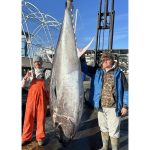At the conclusion of their week-long meeting in Genoa, the 49 member governments of the International Commission for the Conservation of Atlantic Tunas (ICCAT) today adopted, with overwhelming support, increases in fishing quota for both West and East Atlantic bluefin tuna. These dramatic and positive measures are consistent with the best scientific advice, recently showing significant increases in Atlantic bluefin biomass.
“We are very pleased that ICCAT has chosen to increase the West Atlantic bluefin quota. The results of the hard work of the team of academic and government scientists this year has validated that Atlantic bluefin stock status has appreciably improved, enabling an increase in fishing quota. ICCAT nations recognized and accepted recent scientific advice and took an exceptionally precautionary approach, particularly with regard to the West Atlantic bluefin resource”, said Rich Ruais, Executive Director of the American Bluefin Tuna Association (ABTA).
ICCAT has decided to increase West Atlantic bluefin tuna quota from its present level of 1,750 mt to 2,000 mt, a 14% increase, for each of the next two years. US fishermen will receive about a 54% share of the increase. The most recent scientific advice actually supported an increase to 2,250 mt but scientists from the National Oceanic and Atmospheric Administration (NOAA) preferred a lower quota.
The Standing Committee for Research and Statistics (SCRS), the scientific arm of ICCAT, along with independent scientists supported by an international scientific research group led by ABTA, recently performed stock assessments on West and East Atlantic-Mediterranean bluefin tuna stocks. The results were released in October 2014 and stated conclusively and unambiguously that both West and East Atlantic bluefin stocks have shown a dramatic increase in spawning stock biomass, the key benchmark for fishery management.
The SCRS also reported that West Atlantic bluefin biomass has increased significantly each year since 2009 and stated that present data on the West Atlantic stock validates that it is not “overfished” and that “overfishing” is no longer occurring.
By following the advice of their own scientists in increasing fishing quotas for Atlantic bluefin, one of the ocean’s most valuable fish, ICCAT reaffirms its commitment to making decisions based upon sound science.
The West Atlantic bluefin stock is fished primarily by the US, Canada and Japan. The East Atlantic-Mediterranean bluefin stock is fished by European, North African and Middle East countries.
Ralph Pratt, president of ABTA, states, “US Atlantic bluefin fishermen are gratified that after decades of restrictive quota regulations, we are finally seeing the dramatic results of our labors in improving scientific understanding of the West Atlantic bluefin stock. We feel perhaps for the very first time, that we have achieved some measure of recognition of our evidence from the fishing grounds regarding the factors that affect sustainable fishing levels, and what those levels should be. Our work is not yet complete and our future success is at risk if we fail to continue to maintain a high level of involvement by independent scientists in future research and stock assessments.”
Rich Ruais points out, “The important takeaway from the results of this ICCAT meeting is that when we focus on precisely what the science is telling us today about the state of Atlantic bluefin stocks, rather than reverting to biased and uncertain historical estimates, we can arrive at a clear understanding of healthy and sustainable Atlantic bluefin catch limits. Finally, with this modest increase in fishing quota we recognize that, over time, nature and the environment can change and affect fish stocks.”
For further information, contact:
Rich Ruais
Executive Director
American Bluefin Tuna Association
Tel: (603) 898-8862
Cell: (603) 490-4715
or
Ralph Pratt, President
American Bluefin Tuna Association
Cell: 781-589-0815
Visit us on our website





